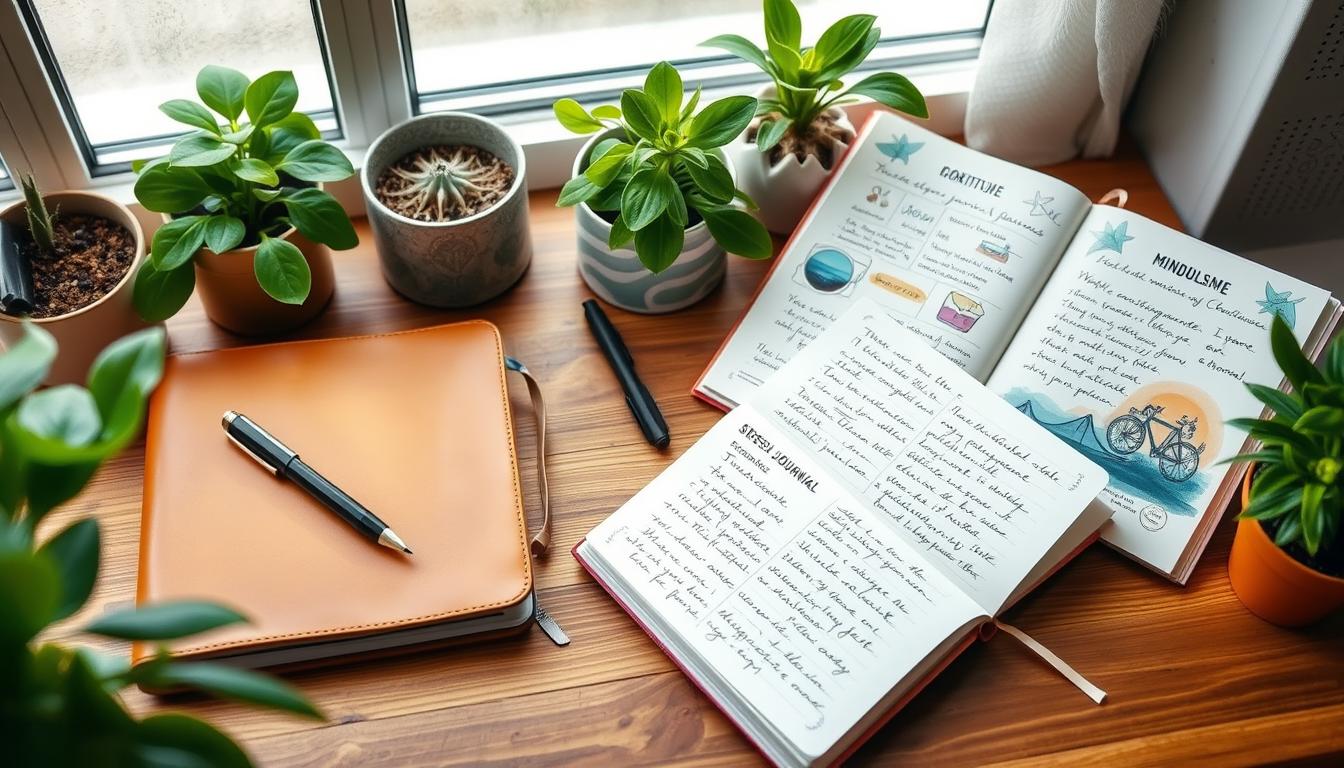Journaling is a popular way to manage stress, and it’s effective. It helps people process their emotions and find clarity. By learning to use journaling in managing stress, you can start living a more balanced life.
Journaling lets you express your thoughts and feelings. It’s a way to release tension and gain a new perspective. This can make a big difference in your mental health.

A workspace with an open journal and a fountain pen.
Knowing how journaling helps with stress is important. By making journaling a part of your daily routine, you can see its benefits. It’s great for dealing with tough emotions or just clearing your mind.
Learning to use journaling for stress can be simple yet powerful. It can greatly improve your overall well-being.
Key Takeaways
- Journaling can be a powerful tool for managing stress
- The benefits of journaling for stress relief include emotional release and clarity
- Learning how to use journaling to manage stress can improve overall well-being
- Journaling provides an outlet for expressing thoughts and feelings
- Incorporating journaling into daily life can have a positive impact on mental health
- Journaling can be used to process difficult emotions and gain perspective
Understanding the Connection Between Journaling and Stress Relief
Journaling is a great way to manage stress every day. It helps people understand themselves better by putting their thoughts and feelings into words. Writing regularly, reflecting, and expressing oneself are key to reducing stress.
The Science Behind Written Expression and Stress Reduction
Studies show that writing down emotions can improve mental health. It helps reduce stress and anxiety. Journaling lets people see their feelings clearly, giving them control over their emotions.
How Journaling Affects Your Brain Chemistry
Journaling can change brain chemistry, releasing happy chemicals. This can make mood better and stress lower. Adding journaling to daily life can boost emotional health and resilience.
The Emotional Release Through Writing
Writing can release emotions, helping people heal from tough times. It increases self-awareness and acceptance. These are key for managing stress through journaling.
The Role of Journaling in Managing Stress: A Comprehensive Overview
Journaling is a great way to handle stress. It helps people understand their feelings better. By using special prompts, you can tailor journaling to fit your needs.
Some benefits of journaling for stress relief include:
- Reduced anxiety and depression
- Improved mood and emotional regulation
- Increased self-awareness and introspection
Adding journaling to your daily routine can boost your mood. It’s important to use prompts or strategies that mean something to you. This way, journaling becomes a meaningful part of your life.https://www.youtube.com/embed/Lkr5s3fGzCI
Journaling can become a key part of keeping your mind healthy. It helps you manage stress and feel better. By using prompts and strategies that work for you, you’re on your way to a happier life.
| Journaling Technique | Benefits |
|---|---|
| Guided Journaling Prompts | Reduced anxiety and depression, improved mood |
| Personal Journal Strategies | Increased self-awareness, improved emotional regulation |
Getting Started with Stress Relief Journaling
Starting a stress relief journaling journey can change your life. It offers many emotional benefits. Writing can help you understand your thoughts and feelings better.
Essential Materials for Your Journaling Practice
You’ll need a journal, a pen, and a quiet place to write. Choose a journal that makes you want to write. Try different pens or pencils to find your favorite.
Creating Your Perfect Journaling Environment
Creating the right space is key for journaling. Find a quiet, private spot. Set aside time to write without distractions. This lets you fully enjoy the writing therapy.
Choosing Between Digital and Paper Journals
Deciding between digital and paper journals depends on you. Both have their benefits. Choose what inspires you to write and reflect.
Different Types of Stress Management Journals
Managing stress can be easier with creative journaling ideas to reduce stress. There are many types of journals for stress management. Each one meets different needs and tastes. Some favorites include:
- Morning pages journals for stream-of-consciousness writing
- Gratitude journals to focus on positive aspects of life
- Art journals for expressive and creative stress relief
Mindful journaling practices for stress control offer a structured way to manage stress. These practices help you reflect on your thoughts, feelings, and experiences. They help you understand yourself better and manage stress more effectively.

An assortment of stress management journals.
Exploring different journals and mindful journaling practices for stress control can help you find what works best. This can lead to a more balanced and stress-free life.
| Journal Type | Description |
|---|---|
| Morning Pages | Stream-of-consciousness writing to clear the mind |
| Gratitude Journal | Focusing on positive aspects of life to cultivate gratitude |
| Art Journal | Expressive and creative outlet for stress relief |
Effective Journaling Techniques for Emotional Release
Journaling is a great way to handle stress and boost your mood. By using the right journaling techniques, you can feel better and manage stress. It’s key to find a method that suits you and make journaling a regular part of your self-care.
Stream of Consciousness Writing
This method means writing down your thoughts and feelings without stopping. It’s a good way to understand your emotions and clear your mind. Start by setting a timer for 10-15 minutes and write whatever comes to mind.
Structured Reflection Methods
Structured methods use prompts or questions to guide your journaling. They help you focus on certain areas of your life and understand your thoughts and feelings better. Here are some prompts to try:
- What are you grateful for today?
- What are your goals and aspirations?
- What challenges are you facing and how can you overcome them?
Gratitude Journaling Practices
Gratitude journaling is about listing things you’re thankful for each day. It helps you see the positive side of things and feel more positive. Start by writing down three things you’re thankful for each day before bed. Explain why you’re thankful and how it’s made your life better.
| Journaling Technique | Benefits |
|---|---|
| Stream of Consciousness Writing | Processes emotions, gains clarity on thoughts |
| Structured Reflection Methods | Focuses on specific areas of life, gains insight into thoughts and feelings |
| Gratitude Journaling Practices | Cultivates a positive mindset, shifts perspective |
Incorporating Mindfulness into Your Journaling Practice
Using daily journaling can help manage stress and anxiety. Adding mindfulness to your journaling can make it even more effective. Mindfulness means being fully present and aware of your thoughts and feelings.
Journaling techniques that reduce stress can include mindfulness exercises. These, like deep breathing and meditation, help calm your mind and body. This way, you can better handle stress and anxiety.
Related: Mindfulness Meditations for Beginners: Find Inner Calm
Here are some tips to add mindfulness to your journaling:
- Begin with a mindfulness exercise, such as deep breathing or meditation, to calm your mind and focus your attention
- Write in the present moment, without worrying about grammar or spelling
- Focus on your thoughts and emotions, and try to understand what you are feeling

A peaceful garden view, evokes a sense of mindfulness and reflection in the act of journaling for stress relief.
Adding mindfulness to your journaling makes it a more effective tool for managing stress and caring for yourself. Be patient and kind to yourself as you grow in mindfulness. Don’t hesitate to try new things and explore different techniques.
Creative Journaling Exercises for Stress Relief
Doing creative journaling can really help with stress. By using guided journaling prompts, you can find ways to feel better. It’s a great way to take care of your mind and heart.
Art Journaling Techniques
Art journaling uses pictures and colors to show how you feel. It’s great for those who find it hard to say what they’re feeling. Here are some cool ways to do it:
- Use colors to show different feelings
- Make collages with happy images
- Try out different textures and materials
Poetry and Prose Expression
Writing poetry or stories can help you understand your feelings better. Guided prompts can help you find your creative side. This way, you can learn more about yourself.
Visual Stress Mapping
Visual stress mapping lets you draw out what stresses you. You can use diagrams or mind maps. It helps you see how things are connected and find ways to feel better.
| Journaling Technique | Benefits |
|---|---|
| Art Journaling | Expresses emotions through visual elements |
| Poetry and Prose Expression | Processes emotions and gains insight |
| Visual Stress Mapping | Identifies patterns and connections between stressors |
Developing a Consistent Journaling Routine
Starting a regular journaling habit is key to enjoying its emotional benefits. Writing therapy helps you process feelings and understand your thoughts and actions better. To keep up with journaling, set achievable goals and find triggers that fit your schedule.
Here are some tips to help you journal regularly:
- Begin with short journaling sessions, just a few minutes a day
- Choose a fixed time and spot for journaling, like morning or before sleep
- Try different journaling styles, like free writing or prompts, to see what suits you
By making journaling a daily part of your routine, you can feel the stress relief it offers. The goal is to make journaling a habit by setting realistic goals and finding triggers that fit your life.

Creating a peaceful atmosphere for reflection and stress relief.
With regular practice, you can use writing therapy to better understand yourself and your feelings.
| Journaling Technique | Benefits |
|---|---|
| Stream-of-consciousness writing | Reduces stress and anxiety, increase self-awareness |
| Prompt-based journaling | Improves focus and creativity, enhances problem-solving skills |
Overcoming Common Journaling Obstacles
Many people struggle to keep up with journaling. To beat these hurdles, try creative journaling ideas to reduce stress and mindful journaling practices for stress control. These can keep you going and help you find peace.
Common journaling hurdles include not having enough time, finding it hard to start, and keeping up. Here are some tips to help:
- Begin with just a few minutes each day for journaling
- Try different journaling styles, like writing freely or focusing on what you’re thankful for
- Make journaling a regular part of your day, like before bed or in the morning
By using creative journaling ideas to reduce stress and mindful journaling practices for stress control, you can beat these challenges. Be gentle with yourself and don’t be afraid to explore new methods.
With regular effort and patience, journaling can become a powerful tool. It can help lower stress and anxiety, and boost your self-awareness and emotional control. By prioritizing journaling, you’re on your way to a more mindful and fulfilling life.
| Journaling Technique | Benefits |
|---|---|
| Stream-of-consciousness writing | Reduces stress and anxiety, increases self-awareness |
| Gratitude journaling | Increases positivity and well-being, improves sleep quality |
| Mindful journaling | Enhances emotional regulation, increases self-compassion |
Advanced Journaling Strategies for Deep Stress Management
Journaling is a great way to manage stress. It can bring deep relief when used right. Knowing how to use journaling for stress can make a big difference.
Some advanced journaling strategies include:
- Shadow work journaling: exploring the unconscious mind to uncover hidden emotions and thoughts
- Future self dialogues: writing letters to your future self to gain clarity and perspective
- Emotional pattern recognition: identifying patterns in your emotions to better understand yourself
Using these strategies can help you feel better and improve your well-being. Remember, journaling works best when you do it regularly and patiently. Make it a part of your self-care routine.
| Journaling Strategy | Benefits |
|---|---|
| Shadow work journaling | Increased self-awareness, reduced stress and anxiety |
| Future self dialogues | Improved goal-setting, increased motivation |
| Emotional pattern recognition | Better emotional regulation, increased emotional intelligence |
Measuring Your Progress Through Journal Reviews
Regularly reviewing your journal entries is key to stress management through daily journaling. It lets you track your progress, spot patterns, and understand your thoughts and feelings better. This helps you improve your effective journaling techniques for stress reduction, making your journaling more effective.
To make the most of your journal reviews, follow these tips:
- Make time to review your entries, letting yourself reflect on your experiences and emotions.
- Look for recurring themes or patterns in your writing. These can show where you need to focus on stress management.
- Celebrate your successes and accomplishments, no matter how small. This boosts positive habits and motivation.
By adding journal reviews to your routine, you’ll get to know yourself and your stress management needs better. This helps you develop more effective journaling techniques for stress reduction, improving your overall well-being.
Remember, the secret to good journaling is being consistent and patient. With regular practice and thoughtful review, you can unlock the full power of stress management through daily journaling to better your mental health and resilience.
| Journal Review Tips | Benefits |
|---|---|
| Regularly review your entries | Tracks progress, identifies patterns |
| Reflect on experiences and emotions | Gains insights, refines journaling techniques |
| Celebrate successes and accomplishments | Reinforces positive habits and motivation |
Combining Journaling with Other Stress Management Techniques
Journaling is a great way to manage stress. When you add other techniques to it, it gets even better. Using guided journaling prompts can make a big difference in your daily life. You can also find journal strategies that fit your personal needs.
Some popular ways to mix journaling with other stress management techniques include:
- Meditation and journaling: This combo lets you think about your feelings and then write about them.
- Exercise and writing integration: Doing physical activities can lower stress. Writing about them can add extra benefits.
You can also read: 10 Simple Mental Health Activities for Classrooms
Trying these combinations can help you manage stress better. Using guided journaling prompts and personal journal strategies can help you understand yourself more. This can also improve how you handle stress.
Remember, the best stress management is what works for you. Try different combinations to find what relaxes and focuses you the most.
| Technique | Benefits |
|---|---|
| Meditation and journaling | Reduces stress, improves focus |
| Exercise and writing integration | Enhances mood, increases self-awareness |
Conclusion: Embracing Journaling as Your Stress Management Companion
As you start your journey with stress-relieving journaling, take a moment to celebrate your progress. Using writing therapy for stress management has shown to be a strong tool for emotional release and self-discovery. By embracing the emotional benefits of stress journaling, you’ve gained a deeper understanding of your thoughts, feelings, and how to cope.
Journaling is not a one-size-fits-all solution, but a personalized way to handle life’s challenges. Try different techniques to find what works best for you. Make journaling a regular part of your self-care routine. The real value is in the journey, not just the end result.
See journaling as your trusted ally in managing stress. With each entry, you’ll grow in self-awareness, and resilience, and learn to handle stress better. Start this journey and watch your well-being grow.
FAQ
What are the benefits of journaling for stress relief?
Journaling helps release emotions and boosts self-awareness. It also improves problem-solving skills. Writing down your thoughts and feelings can reduce anxiety and bring calm.
How can I use journaling to manage stress?
Journaling is great for stress management. Set aside time each day to write. Use prompts or write freely. Try different methods to find what works for you.
What are some effective journaling techniques for stress reduction?
Techniques like a stream of consciousness and structured reflection help. Gratitude journaling also works. These methods help process emotions and shift your mindset positively.
How can I create a journaling practice that supports my stress management goals?
Start by setting a regular writing schedule. Choose a journal that feels right to you. Experiment with different styles to find what suits you best.
What are some creative journaling ideas for reducing stress?
Try art journaling or visual stress mapping. Use poetry or prose to express yourself. These creative methods can help you process emotions in new ways.
How can I incorporate mindfulness into my journaling practice?
Use mindful prompts and focus on your senses. Reflective exercises can deepen your self-awareness. This can enhance the stress-relieving benefits of journaling.
What are the emotional benefits of stress journaling?
Stress journaling boosts self-awareness and emotional control. It helps you process emotions and feel more in control. Writing can be a healthy way to release feelings.
How can I overcome common obstacles to maintaining a journaling practice?
Overcome obstacles by setting realistic goals and finding time to write. Experiment with different formats until you find one that feels right. This can help you stay consistent.
